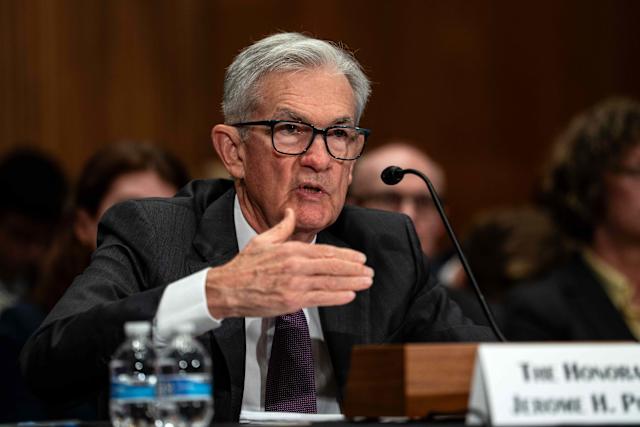关于降低利率是否有助于缓解住房市场压力的标题建议为,Fed Chair Powell,利率调整与住房市场相关性探讨
Fed Chair Jerome Powell在国会面前表示,降低利率可能并不一定直接导致降低住房成本,高 mortgage rates 已成为一个普遍问题,引发了立法者和行政官员的关注,近年来,由于历史性的住房价格飙升,高房价问题持续存在,而立法者、官员和购房者都对此表示质疑。

历史回顾:
近年来,由于房地产市场的复杂性和供需关系的影响,房价持续上涨,高利率政策已经对购房市场产生了影响,导致一些购房者感到难以负担高昂的房贷,一些立法者和行政官员也质疑中央银行的政策是否真正影响了住房成本。
Powell的观点:
在最近的一次国会听证会上,Fed Chair Jerome Powell明确表示,降低利率不一定能直接解决住房成本问题,他强调了长期供应短缺是当前住房价格上涨的主要原因,而不是单纯地依赖利率调整,他认为,尽管如此,短期内房价可能仍然会受到一定影响,因为供应短缺问题可能持续一段时间。
Powell还警告称,高房价问题可能还会持续一段时间,即使在中央银行最终降低了利率的情况下,他指出,高房价不仅影响购房者的经济状况,还可能对房地产市场和整个经济产生长期影响。
其他因素:
除了利率之外,其他因素也可能对住房成本产生影响,低库存和高需求是当前房地产市场的主要问题,高保险费用、材料成本和劳动力短缺等问题也持续存在,需要综合考虑多个因素来评估住房成本。
中央银行和政府一直在努力控制房地产市场的泡沫和供应过剩问题,尽管一些政策措施旨在降低购房成本和提高市场流动性,但房价上涨的原因是多方面的,需要综合考虑多种因素来评估住房成本和房地产市场的发展趋势,也需要加强监管和调控措施,以促进房地产市场的健康发展。
In light of Powell's skepticism, there seems to be a general consensus that the Fed must tread carefully with its policy decisions on interest rates rather than automatically lowering them in hopes for immediate housing market recovery.
While a rate cut might appear as an immediate booster for the housing market, Fed Chair Powell's caution signals that good policy decisions should prioritize long-term stability rather than short term fixes - implying deeper issues at play.
Cautious optimism prevails among Fed policy watchers as Chairman Powell expresses uncertainty regarding whether lower interest rates alone can revive the housing market, suggesting a more holistic approach may be necessary.
Powell's reticence on whether lower interest rates will substantially boost the housing market underscores a nuanced view, suggesting that there are more complex dynamics at play beyond just monetary policy adjustments.
Though expectation looms large for a rate cut to boost the housing market, Fed Chair Powell's cautious stance suggests such measures could be unsettling rather than soothing without careful consideration.
Reversing course on interest rates—as some policymakers have advocated for a boost in housing activity, amidst recent market downturns--could be an unwise maneuver according to Fed Chair Powell'sWithdrawal requires precision while supporting growth concerns."
Powell's hesitance suggests that while lower interest rates might initially provide a boost to the housing market, long-term stability and structural changes may be more crucial factors for sustainable growth.
In an era of uncertain economic conditions, Chairman Powell's reservation on the effectiveness of rate cuts in supporting a recovering housing market highlights both nuance and prudence needed during monetary policy decisions that can profoundly impact consumers.
Despite the optimism around lower interest rates, Fed Chair Powell's cautionary note underscores that a swift recovery in housing may not be solely contingent on rate reductions. Risk-on assessments and sustainable growth strategies could still play pivotal roles.
Despite mounting pressure to intervene, Fed Chair Powell's hesitance towards cutting rates suggests a cautious approach that may be better suited for nurturing rather than stimulating the housing market recovery.
Despite the anticipation for rate cuts to stimulate housing, Fed Chair Powell's caution suggests that an overreliance on interest rates might not be enough of a cure-all without accompanying reforms in other aspects.
In Powell's words, the housing market resilience should not be taken for granted and further reductions in interest rates may have varying levels of effectiveness given its complexity rather than a straightforward boost as once assumed.
Though reduced interest rates are a common stimulus for boosting the housing market, Fed Chair Powell's caution highlights that this solution may not be as straightforward or effective. With greater emphasis on inflation risks and economic caveats beyond just home prices growth.



![VMware 2V0-72.22 Practice Test - Get Excellent Scores [2024]](https://antiochtenn.com/zb_users/upload/2025/08/20250831174004175663320490757.jpg)









![Fibrin Sealant Market Advancements and Business Opportunities [2028]](https://antiochtenn.com/zb_users/upload/2025/08/20250831183354175663643499373.jpg)